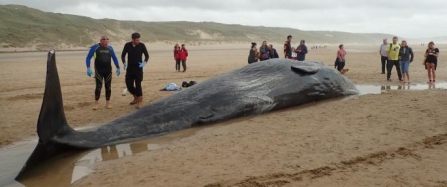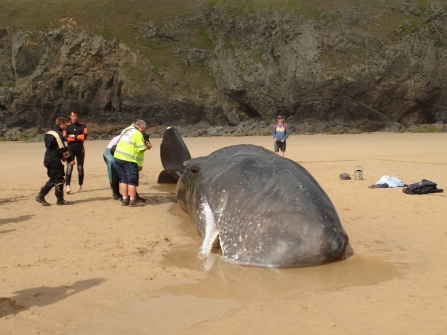
Photo by Niki Clear

Photo by Niki Clear
Each year, hundreds of dead whales and dolphins are washed up on the beaches of Cornwall and the Isles of Scilly. In response to this, Cornwall Wildlife Trust developed its Marine Strandings Network (MSN) of volunteers who currently collect and record information from stranded marine wildlife. MSN volunteers record the carcasses of dead cetaceans and, where appropriate, retrieve them for post mortem examination on behalf of its partner, the Institute of Zoology under the Defra funded UK Cetacean Strandings Investigation Programme (CSIP).
Measuring over ten metres in length, the female sperm whale was recorded by Trust volunteers after its death using MSN methodology. It is hoped that investigations will continue and that the Institute of Zoology will be able to carry out a post mortem if the correct permissions are obtained by the land owners.

Photo by Niki Clear
Records of dead marine animals provide an important source of information about the status and health of these species in our waters. Trends in the number and distribution of strandings can provide clues about the movements and population size of cetacean species. Post-mortem examination yields vital information about the cause of death and also provides information about cetacean biology, ecology and population health and structure.
Sperm whales usually prefer deep waters, where they feed primarily on squid, and are rarely encountered close to shore. Proof of this whales preferred diet could be seen on the carcass, where large sucker marks remained from its deep water hunting activity with its squid prey. What is of particular interest is that this animal was a female, unusual due to the fact female sperm whales are usually found in tropical and temperate waters and rarely venture this far north.
Abby Crosby, Marine Conservation Officer for Cornwall Wildlife Trust said,
"It was a sad end for this amazing whale, but by examining these strandings it at least gives us a chance to investigate these animals properly and learn more about them. And the more we know, the better we're able to fight for their protection".
The public are also urged to report stranded marine wildlife to the Network on their Hotline number, 0345 201 2626, which is monitored every day of the year. For more information on the Marine Stranding Network and its work please see www.cwtstrandings.org.